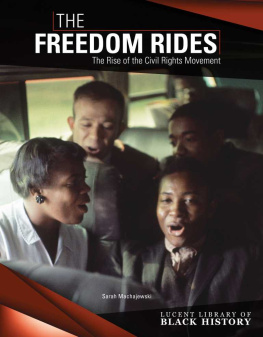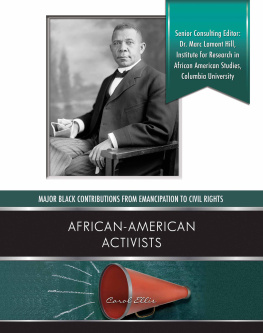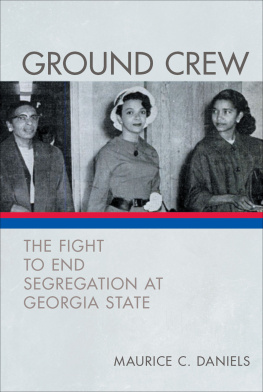Unjust Deeds
Justice, Power, and Politics
COEDITORS
Heather Ann Thompson
Rhonda Y. Williams
EDITORIAL ADVISORY BOARD
Peniel E. Joseph
Matthew D. Lassiter
Daryl Maeda
Barbara Ransby
Vicki L. Ruiz
Marc Stein
The Justice, Power, and Politics series publishes new works in history that explore the myriad struggles for justice, battles for power, and shifts in politics that have shaped the United States over time. Through the lenses of justice, power, and politics, the series seeks to broaden scholarly debates about Americas past as well as to inform public discussions about its future.
More information on the series, including a complete list of books published, is available at http://justicepowerandpolitics.com/.
This book was published with the assistance of the Thornton H. Brooks Fund of the University of North Carolina Press.
2015 Jeffrey D. Gonda
All rights reserved
Manufactured in the United States of America
Set in Charter and Museu Slab
by Westchester Publishing Services
The paper in this book meets the guidelines for permanence and durability of the Committee on Production Guidelines for Book Longevity of the Council on Library Resources.
The University of North Carolina Press has been a member of the Green Press Initiative since 2003.
Cover illustration: House for sale at 6911 Eighth St. N.W., Washington, D.C.
Library of Congress Cataloging-in-Publication Data
Gonda, Jeffrey D., author.
Unjust deeds : the restrictive covenant cases and the making of the civil rights movement / Jeffrey D. Gonda.
pages cm. (Justice, power, and politics)
Includes bibliographical references and index.
ISBN 978-1-4696-2545-4 (cloth : alk. paper) ISBN 978-1-4696-2546-1 (ebook)
1. Shelley, J. D.Trials, litigation, etc. 2. Kraemer, LouisTrials, litigation, etc. 3. Discrimination in housingLaw and legislationUnited StatesCases. 4. Real covenantsUnited StatesCases. 5. African AmericansLegal status, laws, etc.United StatesCases. I. Title.
KF228.S53G66 2015
344.73063635ldc23
2015010508
Portions of chapters 2, 3, and 4 appeared earlier in somewhat different form in Jeffrey D. Gonda, Litigating Racial Justice at the Grassroots: The Shelley Family, Black Realtors, and Shelley v. Kraemer (1948), Journal of Supreme Court History 39, no. 3 (November 2014): 32946.
For my grandmothers,
Maxine Moore Sehring and Elizabeth Chandler Gonda,
who taught me everything I know about strength,
and for Paul Gonda,
who was loved and left us too soon.
To the one who knocks, the door will be opened.
Matthew 7:8
I say to you today, the Negro stands on the porch and knocks. He holds in his hands the bill for nearly three centuries of unrequited toil. He knocks. Let me come in, he says. Let me come in and sit by the fire. I helped to build this house!
George L. Vaughn, attorney for J. D. and Ethel Lee Shelley
Contents
INTRODUCTION
Restrictive Covenants, Housing Rights, and the Civil Rights Movement
CHAPTER ONE
Covenants: Race and Housing in the 1940s
CHAPTER TWO
Courtrooms: Local Lawyers and Legal Activism
CHAPTER THREE
The NAACP: National Leadership and Housing Desegregation
CHAPTER FOUR
To Washington: The Department of Justice and the Supreme Court
CHAPTER FIVE
Failures and Foundations: The Covenant Cases and Postwar Black Freedom Struggles
AFTERWORD
A Lingering Debt
Acknowledgments
This project was long in the making and benefited at countless points from the generosity and effort of so many individuals and organizations. The combined support of Yale University, Syracuse University, and the Giles K. Whiting Foundation made possible much of the research and writing that has come together herein. Assistance from the American Historical Associations Littleton-Griswold Research Grant program underwrote key archival research as well.
I have been fortunate to work with an outstanding team at the University North Carolina Press as part of the Justice, Power, and Politics Series. Rhonda Williams and Heather Thompson have been supportive from the moment they laid eyes on the manuscript, and Brandon Proia has brought a deft touch, keen enthusiasm, and a whole lot of man-hours to these pages. The editors believed in this project from the start, and I am grateful for all of their hard work toward putting it into print. Two excellent readers, Rob Smith and Susan Carle, both helped transform this into a stronger book with their encouraging observations, and they have my profound thanks. I am especially indebted to Susan Carle for her extensive and thoughtful comments. She understood the mission of this work with a depth and clarity that was invigorating and that made the text better at every turn.
I owe additional thanks to the people who sustained, challenged, and shaped this work from its inception. At Princeton I benefited from the guidance of Kevin Krusewho first introduced me to the covenant casesDaphne Brooks, Valerie Smith, Eddie Glaude, and Noliwe Rooks. Saje Mathieu inspired me to pursue as a scholar the issues discussed in this book. At Yale I received guidance of a caliber for which I cannot sufficiently express my gratitude. The intellectual fingerprints of John Witt, Jennifer Klein, Jonathan Holloway, and Glenda Gilmore are everywhere in these pages. Jonathan and Glenda were tireless in their efforts to give my writing and my scholarship more nuance and impact. I am forever grateful for their investment in me and for the sterling examples they provided of the power of mentorship. Without them I would not be where I am today. Rick Brooks, Carol Rose, Rick Sander, and Nathan Connolly all shared their work with me along the way and provided illumination and encouragement. The advice and support of Elizabeth Alexander, Ed Rugemer, David Blight, Steve Pitti, Naomi Lamoreaux, Bill Rando, Kathleen Cleaver, Wendy Plotkin, Dan Sharfstein, and Randall Kennedy all made the journey smoother.
A great team of young scholars were intellectual partners as this book took shape, including Ryan Brasseaux, Erin Wood, Allison Gorsuch, Betsy Beasley, Caitlin Verboon, Julia Guarneri, Tafari Lumumba, Lerone Martin, and Chris Bonner. Delaina Price kept me going. Lauren Pearlman offered insight on D.C. and thought-provoking conversations. Sam Schaffer gave wise counsel. Katherine Mooney watched out for me at conferences and on a research trip to Lexington. I found a kindred spirit in Brandon Terry who lent his friendship, time, and expertise to this project for eight years. I have also been blessed with generous and supportive colleagues at Syracuse who have helped move this project along. My thanks go out to Carol Faulkner, Michael Ebner, Andrew Cohen, Keith Bybee, Tom Keck, Grant Reeher, Dave Van Slyke, Elisabeth Lasch-Quinn, Gladys McCormick, Norman Kutcher, Peggy Thompson, Drew Lipman, and a host of other folks who walk the halls here. The institutional support from the Maxwell School and Campbell Public Affairs Institute has been tremendous.
The research for this project took place at an array of institutions and with the help of a number of archivists. Special thanks are owed to Bill Frank of the Huntington Library, Seth Kronemer of the Howard University Law School Library, the staff of the Moorland-Spingarn Archives, Sam Rushay and Randy Sowell at the Truman Presidential Library, and Michelle McKinney at the Wright Museum in Detroit.
To my family, who have listened to me talk about restrictive covenants over dinners and holidays for nearly a decade, I owe more than I can put into words. Their support, love, and patience have been boundless. This work is a testament to the inspiration and encouragement they have provided throughout. Noma Ndlovu, Brandon Nicholson, Brandon Terry, and Jonathan Beauford have been a part of that family for years, and their generosity of spirit made this journey possible. Lastly, I could not have made it to this moment without my wife, Jedidah Isler, whose courage, brilliance, kindness, faith, and love have sustained me from start to finish and beyond. She kept me sanewhich was no easy taskinspired me to reach further and brought joy to each day. You are more than I ever knew to ask for in life. I look forward to all that awaits.





